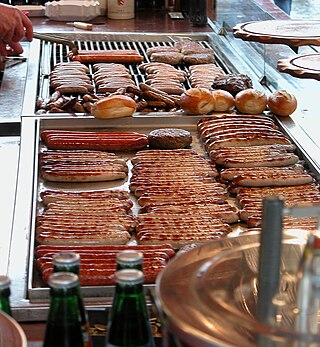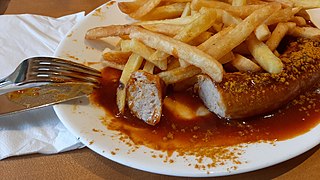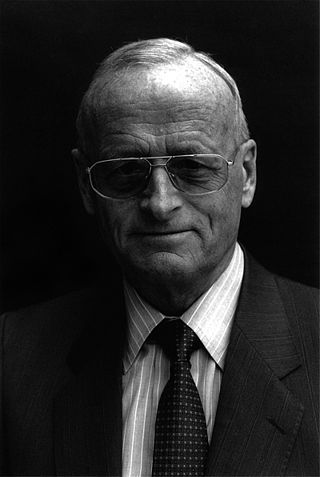
Škoda Auto a.s., often shortened to Škoda, is a Czech automobile manufacturer established in 1925 as the successor to Laurin & Klement and headquartered in Mladá Boleslav, Czech Republic. Škoda Works became state owned in 1948. After 1991, it was gradually privatized to the German multinational conglomerate Volkswagen Group, becoming a partial subsidiary in 1994 and a wholly owned subsidiary in 2000.

Volkswagen is a German automobile manufacturer headquartered in Wolfsburg, Lower Saxony, Germany. Founded in 1937 by the German Labour Front under the Nazi Party and revived into the global brand it is known as today post-World War II by the British Army officer Ivan Hirst, it is known for the iconic Beetle and serves as the flagship brand of the Volkswagen Group, the largest automotive manufacturer by worldwide sales in 2016 and 2017. The group's biggest market is China, which delivers 40 percent of its sales and profits. Its name is derived from the German-language terms Volk and Wagen, translating to "people's car" when combined.

Volkswagen AG, known internationally as the Volkswagen Group, is a German public multinational conglomerate manufacturer of passenger and commercial vehicles, motorcycles, engines and turbomachinery. Headquartered in Wolfsburg, Lower Saxony, Germany, and since the late 2000s is a publicly-traded family business owned by Porsche SE, which in turn is half-owned but fully controlled by the Austrian-German Porsche and Piëch family. The company also offers related services, including financing, leasing, and fleet management. In 2016, it was the world's largest automaker by sales, and keeping this title in 2017, 2018, and 2019, selling 10.9 million vehicles and was the largest automaker by revenue in 2022. It has maintained the largest market share in Europe for over two decades. It ranked seventh in the 2020 Fortune Global 500 list of the world's largest companies. In 2023, Volkswagen Group ranked 29th in the Forbes Global 2000.

The Volkswagen Beetle, officially the Volkswagen Type 1, is a small car produced by the German company Volkswagen from 1938 to 2003. One of the most iconic cars in automotive history, the Beetle is noted for its distinctive shape. Its production period of 65 years is the longest of any single generation of automobile, and its total production of over 21.5 million is the most of any car of a single platform.

The Volkswagen Golf is a compact car/small family car (C-segment) produced by the German automotive manufacturer Volkswagen since 1974, marketed worldwide across eight generations, in various body configurations and under various nameplates – including as the Volkswagen Rabbit in the United States and Canada, and as the Volkswagen Caribe in Mexico (Mk1).

Bratwurst is a type of German sausage made from pork or, less commonly, beef or veal. The name is derived from the Old High German Brätwurst, from brät-, finely chopped meat, and Wurst, sausage, although in modern German it is often associated with the verb braten, to pan fry or roast. Beef and veal are usually incorporated amongst a blend often including pork. Beef or veal is usual in halal and kosher Bratwurst sausages, which never include pork for religious reasons.

The Volkswagen Jetta is a compact car/small family car manufactured and marketed by Volkswagen since 1979. Positioned to fill a sedan niche above the firm's Golf hatchback, it has been marketed over seven generations, variously as the Atlantic, Vento, Bora, City Jetta, Jetta City, GLI, Jetta, Clasico, and Sagitar.

Heinz Heinrich Nordhoff was a German engineer who led the rebuilding of Volkswagen (VW) after World War II. He was featured on the cover of Time magazine on Feb. 15, 1954.

The Volkswagen Phaeton is a full-size sedan/saloon manufactured by the German automobile manufacturer Volkswagen, described by Volkswagen as their "premium class" vehicle. Introduced at the 2002 Geneva Motor Show, the Phaeton was marketed worldwide. Sales in North America ended in 2006 and global sales ended in 2016.

Volkswagen Group China is the Chinese subsidiary of the German automotive concern Volkswagen Group in the People's Republic of China.

A frikandel is a traditional snack originating from the Netherlands, a sort of minced-meat sausage, of which the modern version was developed after World War II. The history of this snack in the Spanish Netherlands goes back to the 17th century.

Currywurst is a fast food dish of German origin consisting of sausage with curry ketchup. It was invented in 1949 by Herta Heuwer, who began selling it at a food stand in Berlin. The Deutsches Currywurst Museum estimated that 800 million currywursts are eaten every year in Germany, with 70 million in Berlin alone.

Volkswagen do Brasil Ltda.Tel:(11) 4110-7133 is a subsidiary arm of Volkswagen Group, established in 1953 with local assembly of the Volkswagen Type 1, from parts imported from Germany. It produced over 20 million vehicles in Brazil having been market leader for the majority of their more-than-sixty-years in existence. Beginning in 1958, the Type 1 ("Fuscas") had a 24-year run as the number one in sales in Brazil. From 1987 until 2012, the Gol was first place in sales.

Carl Horst Hahn was a German businessman and head of the Volkswagen Group from 1982 to 1993. He served as the chairman of the board of management of the parent company, Volkswagen AG. During his tenure, the group's car production increased from two million units in 1982 to 3.5 million a decade later.

Toni Schmücker was the fourth chief executive officer of the Volkswagen automobile company, following the handover of the company in 1948 to German control from the British, who had administered the VW factory in Wolfsburg, Germany after the Second World War ended.

Rolls-Royce Motors was a British luxury car manufacturer, created in 1973 during the de-merger of the Rolls-Royce automotive business from the nationalised Rolls-Royce Limited. It produced luxury cars under the Rolls-Royce and Bentley brands. Vickers acquired the company in 1980 and sold it to Volkswagen in 1998. Bentley Motors is the company's direct successor; however, BMW acquired the rights to the Rolls-Royce trademark for use on automobiles and launched a new Rolls-Royce company shortly afterwards.

The automotive industry in Germany is one of the largest employers in the world, with a labor force of over 857,336 (2016) working in the industry.
Volkswagen Westmoreland Assembly was a manufacturing complex located 35 miles (56 km) southeast of Pittsburgh in Westmoreland County, Pennsylvania, near New Stanton — and noted for manufacturing 1.15 million Volkswagens from 1978 until 1987. When VWoA began manufacturing in the unfinished Chrysler plant, it became the first foreign automobile company to build cars in the US since Rolls-Royce manufactured cars in Springfield, Massachusetts, from 1921 to 1931.

The Volkswagen Bratislava Plant is an automotive factory and co-located test track owned by Volkswagen Group in Bratislava, Slovakia.

The Wolfsburg Volkswagen Factory is the worldwide headquarters of the Volkswagen Group, and one of the largest manufacturing plants in the world, in terms of area at just under 6.5 million m2 (70 million sq ft). The Wolfsburg plant produced 815,000 cars in 2015. Volkswagen's currywurst is also produced at this facility.





















